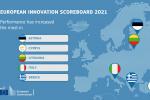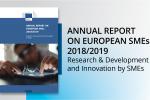
The European Innovation Scoreboard (EIS), published in June, showed that there was an improvement in Greece’s innovation performance in 2018. According to new data, the European Commission announced the EU's innovation performance has shown improvement in the last four years, and for the first time, Europe surpassed the innovation level of the United States of America. In 2018, Greece was in 20th place among the 28 EU countries (in 2017, it was in 22nd place), still one of the member states with a moderate performance in innovation, and below the European average. In the same category as Greece are another 13 countries including Italy, Spain, Portugal and Cyprus.
Generally, over the period 2011-2018, Greece exhibited an upward trend on the Summary Innovation Index, increasing from 61 in 2011 to 82 in 2018. During that timeframe, Greece had the second best EU performance in improving innovation, increasing by 20.2% with Lithuania having the best performance (25.7%). The European average improvement amounted to 8.8%.
The National Documentation Centre (EKT) contributes to the production of innovation indicators by providing the official statistics on innovation in Greek businesses and R&D activities.
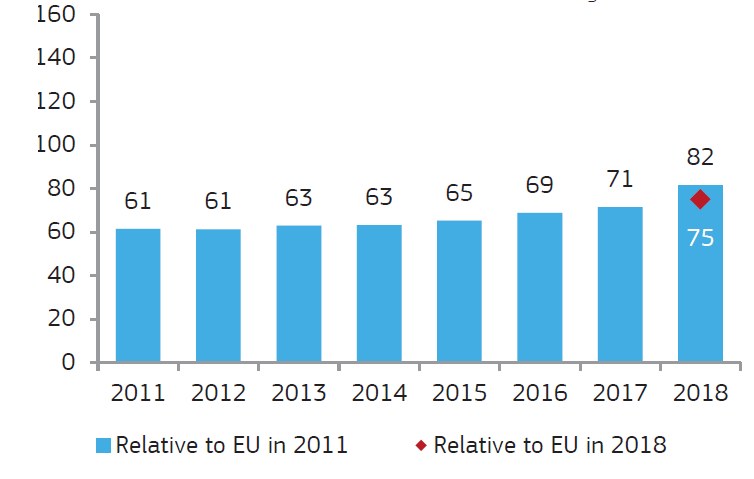
Upward trend of Greece on Summary Innovation Index 2018
Individual indicators show a particularly increased performance of the country in terms of human resources, innovation in Small and Medium Enterprises (SMEs) and co-operation of innovative SMEs with other bodies.
More specifically, Greece is above the European average in ‘Innovators’ and ‘Linkages’ and performed particularly well on indicators for SMEs with innovative products and processes, SMEs with marketing and organisational innovation, SMEs that innovate in-house and SMEs collaborating with others.
The country also performed particularly well on the indicator ‘Population with tertiary education’, exceeding the EU average.
The areas in which the country lagged far behind in terms of the EU average are ‘Intellectual Assets,’ ’Finance and Support, and ‘Innovation-friendly Environment’. The lowest performance related to attracting foreign students for doctoral studies, exports of medium and high technology products and venture capital expenditures.
Ranking of Greece on the European Innovation Scoreboard 2019
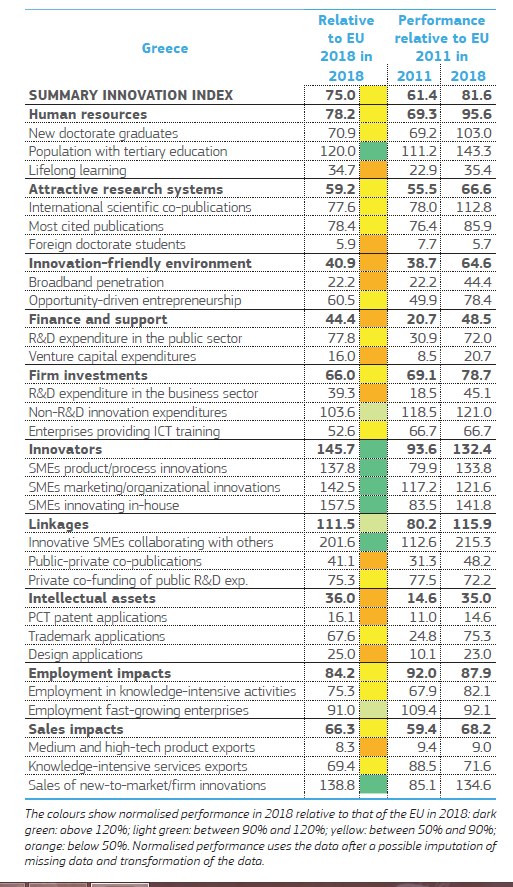
The EU's innovation performance has continuously improved
Based on their scores, EU countries fall into four performance groups: innovation leaders, strong innovators, moderate innovators and modest innovators.
Sweden is a leader in the field of innovation in the EU in 2019, followed by Finland, Denmark and the Netherlands. The United Kingdom and Luxembourg fell from the top spot of countries with good innovation performance, while
Estonia is included in this group for the first time. On average, the EU's innovation performance has improved by 8.8% from 2011. Since 2011, the performance of innovation increased in 25 EU countries. Performance increased more in Lithuania, Greece, Latvia, Malta, the United Kingdom, Estonia and the Netherlands, while that of Romania and Slovenia fell the most.
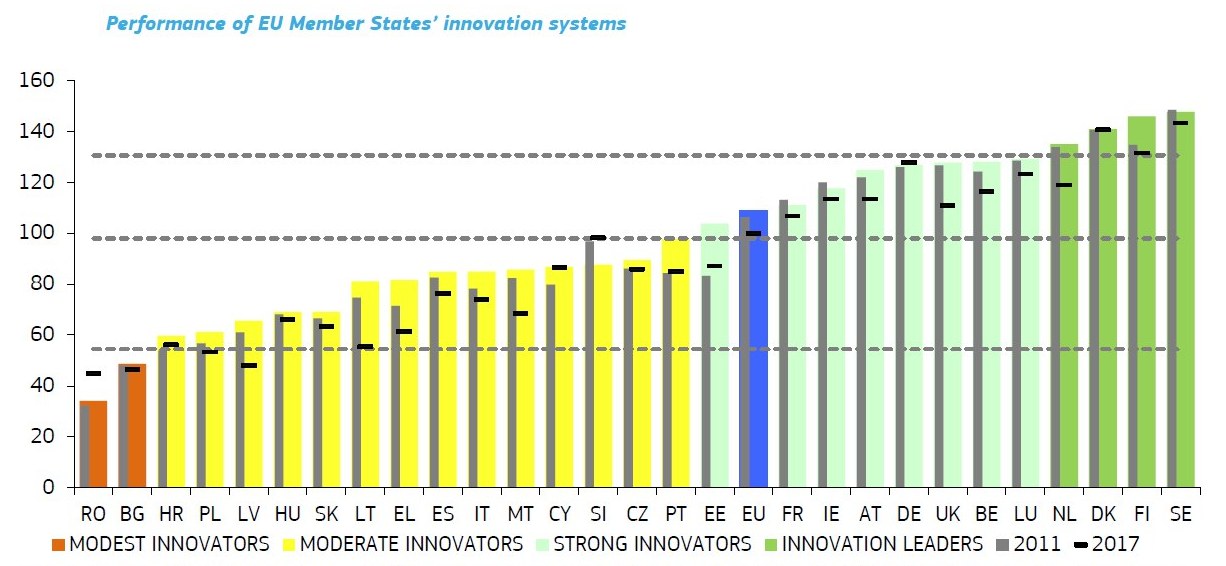
Ranking of countries on the European Innovation Scoreboard. The coloured columns show the innovation performance in 2018, horizontal dashes show performance in 2017 and the grey columns show the performance in 2011, all in relation to the EU average in 2011.
The EU’s performance has surpassed the United States for the first time and has a considerable lead over Brazil, India, Russia, and South Africa. However, China is catching up at 3 times the EU's innovation performance growth rate and Canada, Australia, Japan, maintain a performance lead over the EU.
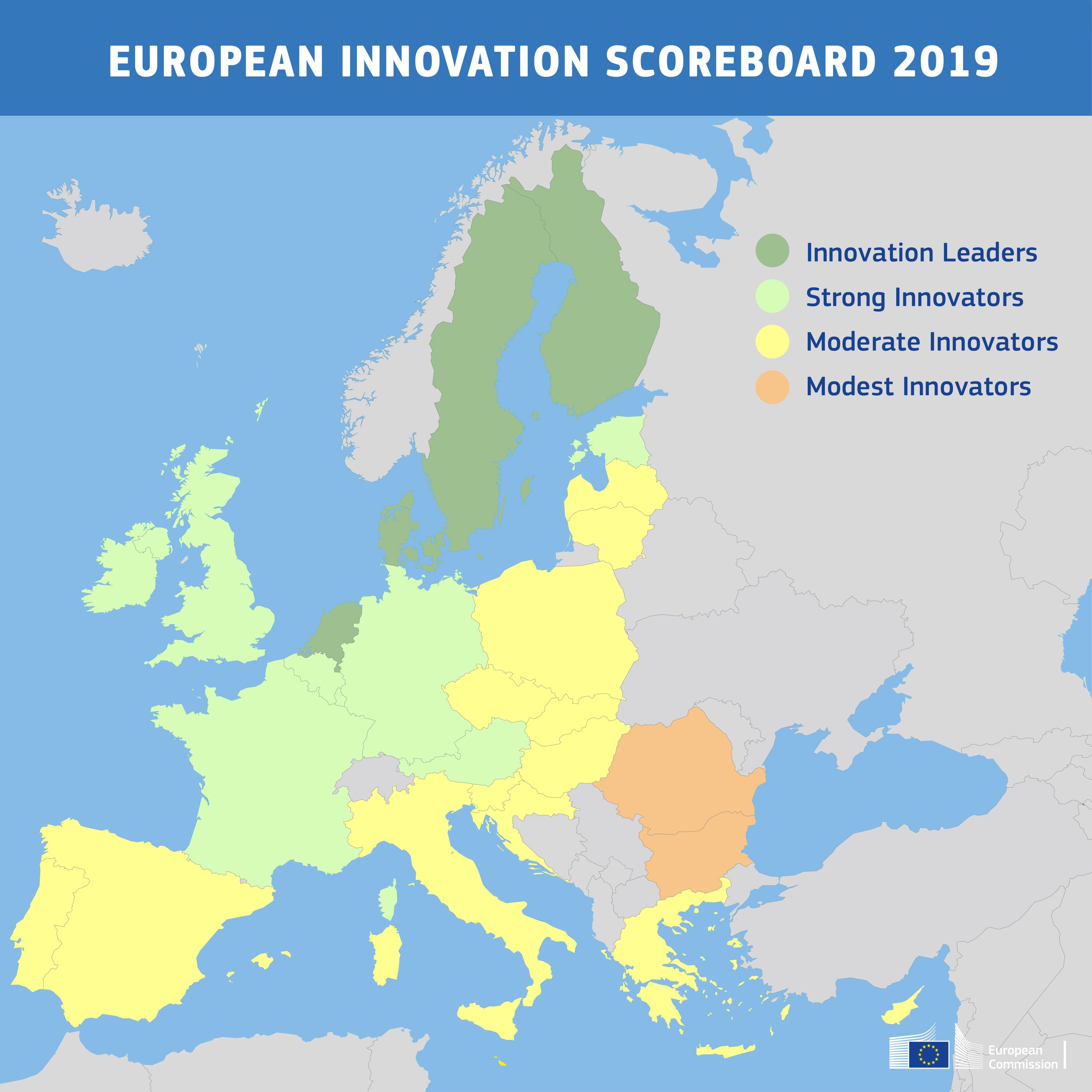
First places are held by: Denmark for human resources and innovation-friendly environment, Luxembourg for attractive research systems, France for finance and support, Germany for firm investment, Portugal for innovative SMEs, Austria for linkages, Malta for intellectual assets, Ireland on the impact on employment and sales.
It is worth noting that about two thirds of Europe's economic growth in recent decades has been driven by innovation. Each euro invested by the new European research and innovation programme ‘Horizon Europe’ can potentially bring performance up to 11 euros of GDP in 25 years. Investment in research and innovation is expected to generate up to 100,000 new jobs in research and innovation activities between 2021 and 2027.
The most innovative regions are in the most innovative countries
The Regional Innovation Scoreboard (RIS2019) is an extension of the European Innovation Scoreboard 2019. This scoreboard provides comparative assessments of innovative systems in 238 regions across 23 EU member states, Norway, Serbia, and Switzerland. In addition, Cyprus, Estonia, Latvia, Luxembourg, and Malta are included at country level.
All leading innovation regions are in countries designated as leaders of innovation or as countries with good innovation performance on the European Innovation Scoreboard.
First of the most innovative regions in the EU is Helsinki-Uusimaa, Finland, followed by Stockholm, Sweden and Hovedstaden, Denmark.
In 159 regions, performance increased between the first and last years of the nine-year observation period. The current scoreboard demonstrates a strong convergence of regional performance with decreasing performance differences between the regions.
As for regional innovation in Greece, Crete has an excellent performance, its performance has increased in recent years by 30.1%, is one of the ‘pockets of excellence’ and is among the strong innovators, with an innovation indicator reaching the European average. This is due to the number of SMEs that are attracting research funds from public resources, the development and marketing of new innovative products, and co-operation between SMEs in knowledge-intensive organisations.
All other regions of the country are in the moderate innovators category except for the Notio Aigaio region which is a modest innovator.
EKT’s contribution to the European Innovation Scoreboard
The National Documentation Centre (EKT) contributes to the production of innovation indicators presented in the European Innovation Scoreboard (EIS), in its role as an agent and a national authority of the Hellenic Statistical System. It is responsible for producing national statistics on Research, Technology, Development and Innovation (RTDI) and sending them to Eurostat, the OECD and other international organisations.
EKT sends the EIS data collected through the Community Innovation Survey with reference to 6 indicators: 'Non R&D innovation expenditures’, ‘SMEs innovating in-house’, ‘Innovative SMEs collaborating with others’, ‘SMEs product /process innovations’, ‘SMEs marketing /organisational innovation’ και ‘Sales of new-to-market/firm innovations’, and conducting surveys on Research & Development activities across all economic sectors in relation to2 indicators for ‘Public R&D Expenditures’ and ‘Business R&D Expenditures'.
Data analysis and production of relevant indicators are published in printed and electronic EKT publications and can be found on the revamped website http://metrics.ekt.gr. The modern design, clear classification and new functionalities, highlights the site’s rich content, which is constantly enriched, updated and renewed, informing policy makers, researchers, journalists and the general public with quality indicators.












